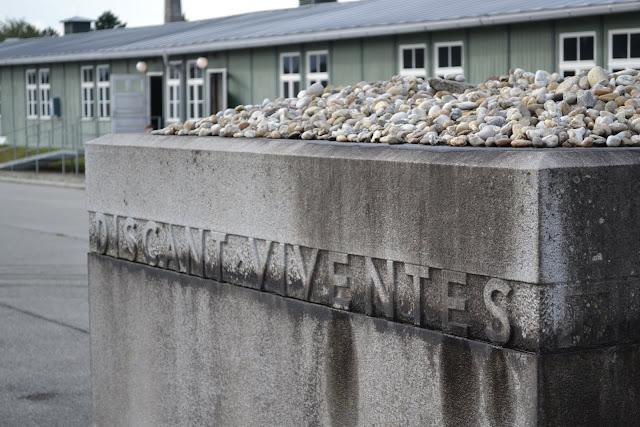Prague was beautiful as always, but it was time to move on... to Austria! We took a double-decker bus the 6 hours between Prague and Vienna (with a stop at Mauthausen Labor Camp) and.... well, it was less than comfortable. First of all, since the time I was about 14, I have been experiencing my genetic predisposition to motion sickness from my mother. The bus was constantly moving back and forth and very noticeably doing so. Second, we were a few hours late leaving from Prague so apparently all bathroom and/or food stops were eliminated. I had never had to go to the bathroom so bad in my life. I just wanted to lay on the floor and cry, fitting since we were traveling very near Adolf Hitler's hometown. You could argue that the Austrian public suffered more than the Germans during WWII. Our guide at Mauthausen Labor Camp (one of the most insightful people I have ever met) focused most of our tour on normality and what we consider to be normal. For the Austrian public, Hitler was a national hero with lots of great ideas. Today, we recognize Adolf's ideals with hatred and animosity, but back then, in that time and place, they were normal and heroic. It's not because these people were trying to be bad human beings (quite the opposite in their opinion) it was just normal to them. It poses an interesting discussion, don't you think? Mauthausen is in no way on the scale of other camps I had been to (Auschwitz-Birkenau, Bergen-Belsen, Dauchau, Treblinka) because of the fact that the only purpose was not extermination, but there's no comparison when it comes to the way a place like that makes you feel. I encourage everyone to visit either a Nazi or Communist camp (or both!) in their lifetime if you get the chance. In this day and age we need to be reminded of what is truly important... people. Friends, family, neighbors, a random person on the street. When we start a war or feud, it's only because we don't give mutual respect and try to understand each other. Viewing places like Mauthausen remind us of the potential evils of humanity and gives us a sobering reason to prevent horrible injustice in the future.
Outside walls of Mauthausen. In front on the bottom, the swimming pool the SS Guards built for themselves.
On the raised part of ground on the left side of the picture, formerly sat a soccer arena for SS Guards who played soccer against traveling teams. It was a local event where people from the town in the valley below would come and watch. The lower part of ground covering the rest of the picture is where a sick camp housing as many as 5,000 prisoners at one time were put to die. It's no bigger than what you see in the picture, a hill begins right off the side of the image. They crammed 5,000 people in that tiny space, and held community soccer games 10 feet away.
The labor done at Mauthausen was primarily mining limestone and iron ore. Although taken back by the earth now, this hill was once dug out for a full mining operation. The stairs winding down the hill in the center of the image were the prisoners means of getting down to the mines. They were often referred to as "the stairs of death" by prisoners because of all of the men who were either trampled or crushed by the stones they were carrying up or down them. Work happened from 5:30AM to 10:00PM. If prisoners weren't crushed or trampled, they often died of exhaustion, heat stroke, dehydration or lack of food. No bathroom breaks were allowed.
On the right, the SS headquarters for Mauthausen. The entire complex was built with stones from the mine. The pulpit on the right was the Mauthausen Nazi Commander's post to give speeches to SS officers below.
Gas chamber at Mauthausen.
Crematorium oven and mementos from visitors all over the world.
A memorial to the Jews killed at Mauthausen. Stones are significant in Jewish culture as a sign of respect and remembrance. The words on both sides translate to something like "The living shall learn from the dead's fate."
"Good is stronger than evil; love is stronger than hate; light is stronger than darkness; life is stronger than death. Victory is ours, victory is ours, through Him who loves us." -Bishop Desmond Tutu



















No comments:
Post a Comment